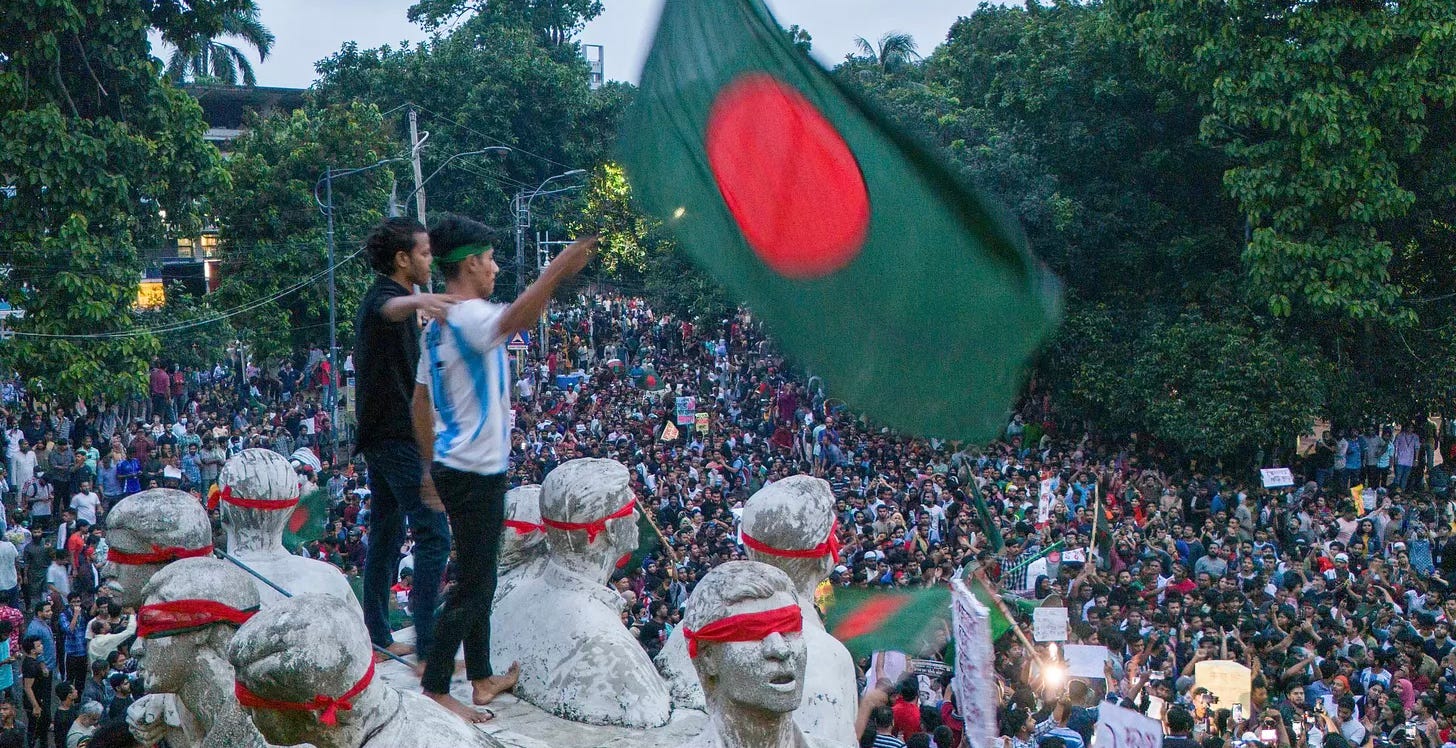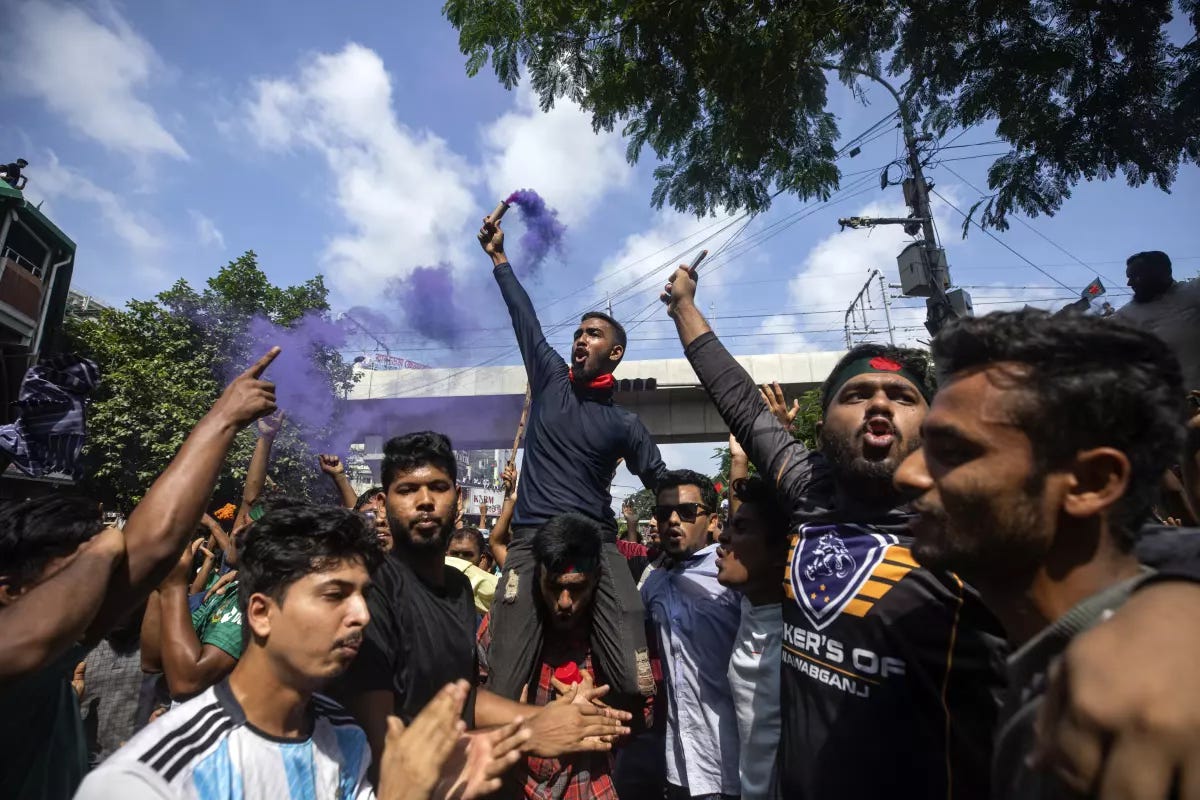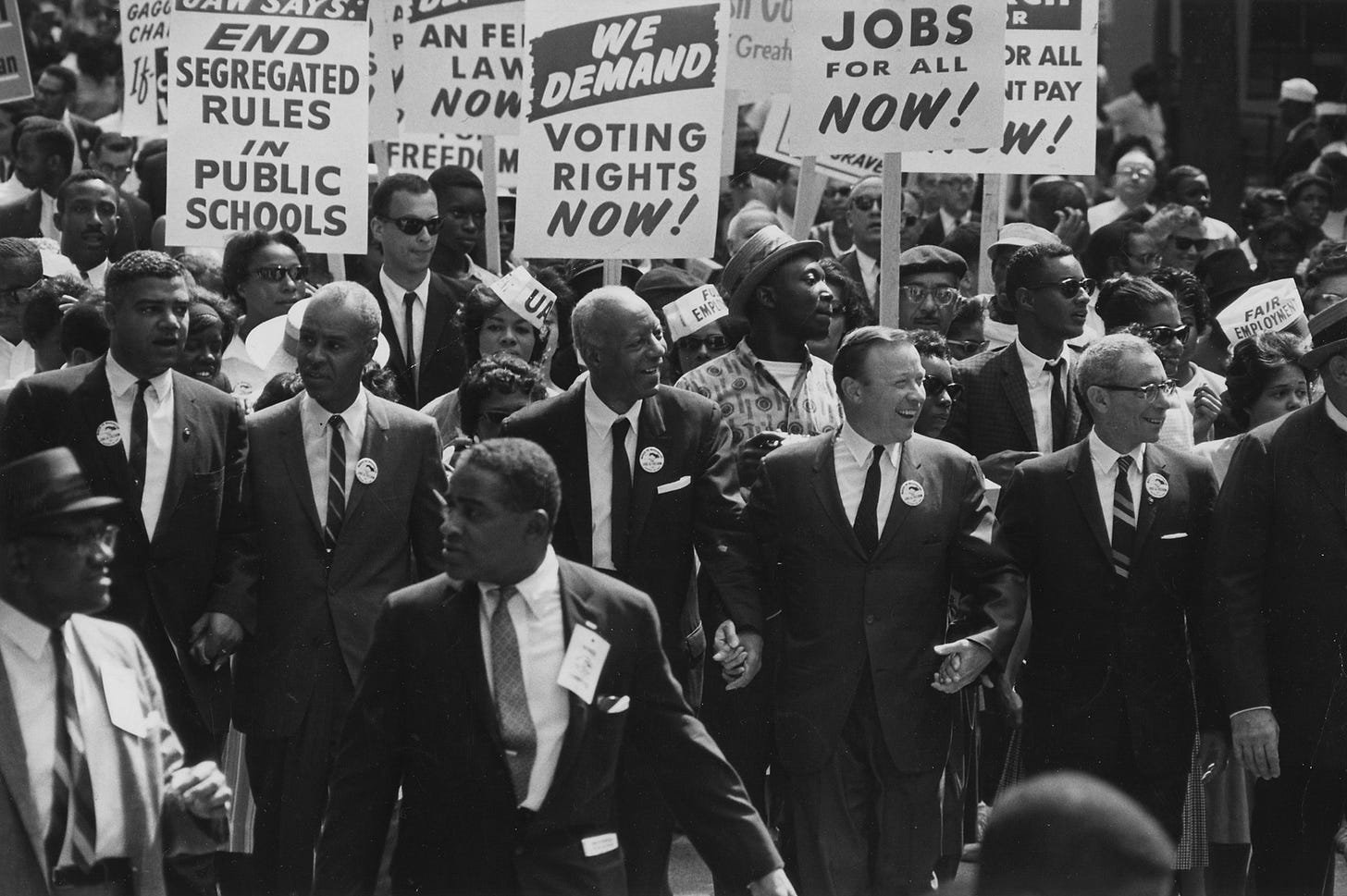Bangladesh Reminds Us To Imagine
On the importance of pushing for better in the face of political pragmatism.

Over the past few days, I’ve been transfixed by the unfolding protests against fascism in Bangladesh, spearheaded by courageous students. Their voices, rising in defiance, pushed against the oppressive weight of Prime Minister Sheikh Hasina’s regime, leading to her eventual resignation and flight to India.
Sheikh Hasina, who had been in power for nearly two decades across multiple terms, left a trail of authoritarian policies and human rights abuses. Her tenure was marked by the silencing of dissent, rampant corruption, and manipulation of the judiciary. The media also suffered under her iron fist, with journalists imprisoned and opposition voices systematically eradicated. The recent reinstatement of a controversial job quota system, which had initially been abolished in 2018, was the catalyst for the current uprising. This quota, favoring the families of those who support Hasina, symbolized the broader inequities and nepotism plaguing the nation.
The protests began in early July, initially as peaceful demonstrations demanding the cancellation of the reinstated job quotas. However, as the government responded with brutal force, the demonstrations grew in scale and intensity. The authorities' violent crackdown, including the use of live ammunition, rubber bullets, and tear gas, resulted in over 200 deaths and thousands of injuries, further fueling public outrage.
Security forces enforced curfews and shut down internet services to stifle communication. The students’ resilience, however, remained unbroken. To the surprise of many, the bloody struggle culminated in Hasina’s resignation, a significant victory that underscores a universal truth: real change demands that we stretch our imaginations to their limits, envisioning a future where justice and equity prevail.
It would have been easy for protestors to accept the status quo, especially in the face of mortal danger, but instead, they embodied a collective yearning for more. The fight in Bangladesh was not just about a singular policy or a leader; but rather about reclaiming the right to envision a future where they can all have something better.
Watching their determination reminded me of a heated exchange I had recently about the current political moment America is in.

One late afternoon, as the sun leaned low like an orange paint streak across the sky, my phone rang. It was one of my close friends wanting to discuss the 2024 presidential election.
“I’m telling you, she can’t say too much,” he insisted. “Kamala has to tread carefully with what Israel is doing in Palestine, climate change, police, all of it. If she wants to win, she has to pick her battles.”
His words tumbled out, each one a brick in a wall of cautious pragmatism. I listened, feeling a tightening in my chest, a constriction that comes from seeing the world through a lens that looks beyond status quo. Our political differences were not new, but they felt heavier now.
“She has to be careful? What about being right? What about figuring out how to stop funding a genocide?” I countered, my voice rising, an echo of the tension I felt. “This isn’t just about winning, it’s about standing for something, about being more than just another politician. She already has her base won. The margins are what she needs—and the margins want progressive policies.”
Our words had begun to blur together, the urgency of our beliefs clashing with a ferocity that felt almost tangible. Then, my friend’s voice, usually measured, erupted through the phone, a sharp crack in our debate.
“We need to beat Donald Trump and Project 2025!” he yelled, the intensity of his conviction breaking through the static. “If we don’t, everything we’ve fought for, everything we believe in, it’s all gone. Don’t you get it?”
The raw desperation in his voice struck a chord, but I couldn’t let it stand unchallenged. The frustration that had been simmering within me boiled over, and I found myself yelling back, my words propelled by a deep, unyielding anger.
“Kamala can do that without the party continuing to uphold the status quo!” I shouted, my voice bouncing off the walls of my living room. “People can’t buy groceries, can’t buy homes, can’t pay student loans, we are funding a genocide, and the police are still killing Black people! We need to be bold, to offer something real, something transformative. I can’t see her winning without doing some of that anyway.”
Our words danced, clashed, and collided, each one a spark in a growing inferno. We argued about what could be said, what should be said, and what must remain unsaid in the theater of politics. It was a reflection of the broader discourse happening across the country, where lines are being drawn in the sand and people find themselves on opposite sides, each convinced of their righteousness.
My friend’s pragmatism seemed to me like a surrender, a reluctant acceptance of a world stripped of imagination. He spoke of past elections and strategies, of what moderate and conservative voters would tolerate and what they wouldn’t. But all I could think of was how we had reached a point where the possible had become a prison, where imagination was chocked by the political middle ground.
We hung up without resolution, the silence of the ended call ringing in my mind. I stared at the phone, thinking a while about what else I should have said to him. How else I could have made my point about us failing ourselves if we can't even dream of having more because we are so afraid of Donald Trump and Project 2025. Because simply beating Trump is the only selling point many need—but not all.
My frustration with him wasn’t merely about whether he agreed with me; it went deeper, into the realm of what we have collectively forgotten. People are so afraid of Trump, fascism, and his potential autocracy that they have lost sight of the need for systemic change in this nation. But maybe they haven’t lost sight—rather they are simply acting as if pushing for needed change to be part of Kamala’s agenda will somehow jinx her candidacy. But I believe the students in Bangladesh, who just stood against their own autocracy remind us what it truly takes.
Defeating Sheikh Hasina was not done with cautious pragmatism but by the daring visions of what could be. Students in Bangladesh should remind us of the power of collective imagination, of dreaming beyond the present constraints.
Reflecting on our own history, it's clear that fearful pragmatism did not lead to the abolition of slavery. It wasn’t caution that secured my right to vote or ensured my basic human rights. These monumental strides were achieved through bold, audacious dreams that dared to envision a future radically different from the oppressive present.

Consider the abolitionists who imagined a world without chains, a vision so powerful that it transcended the grim realities of their time. Think of the suffragettes, who, against all odds, saw a future where women had the right to vote. They weren’t swayed by the cautious counsel of the time, which urged them to wait, to temper their demands. Their unwavering belief in the necessity of change propelled them forward. They understood that true progress requires a leap of faith.
The civil rights movement, with its calls for equality and justice, was also driven by a vision of what America could be. It was the imagination of leaders like Rev. Dr. Martin Luther King Jr., who dared to dream of a nation where people are judged by the content of their character rather than the color of their skin, that galvanized millions into action. It was not the pragmatists but the visionaries who stood on the front lines, facing brutality with the power of their dreams.
We find ourselves in a moment where the shadow of Donald Trump looms ominously over the nation, and those who stand against him pin their hopes on Kamala Harris, longing to see her ascend as the first woman president. Yet, in our fervent desire to see Trump defeated, we cannot allow fear to become our master, silencing our demands for real progress. We cannot, must not, let our trepidation imprison us within the stifling confines of the status quo—a status quo that has wrought devastation upon the Palestinian people, torn families asunder under the crushing weight of poverty, transformed healthcare into an unattainable luxury for millions, and expanded the chasm of wealth inequality to unprecedented depths.
Fear is a blunt instrument. It smashes through nuance, tramples over subtlety, and leaves us clutching at the remnants of what we dare to believe in. In the shadows of Trump, we find ourselves making deals with our own despair, trading our most fervent hopes for the promise of safety—for some. But fear is not a foundation. It’s a shackle, a chain that binds us to the present, making us forget that we have the power to imagine, to demand, to build a world that reflects our deepest ideals.
Kamala Harris stands at the precipice of history, a symbol of what could be. Yet, we must remember that symbols are not saviors. They are reflections of our collective will, our shared determination to craft a future that transcends the failures of our past. To place her on a pedestal without pushing her policies and rhetoric beyond the status quo is to betray the very dreams that elevate her.
It is not enough to simply oppose Trump. Resistance without vision is a hollow endeavor, a fight that leaves us exhausted but unchanged.
Let us remember how we arrived at the cusp of potentially electing a Black and South Asian woman as president, a mere sixty years after the end of Jim Crow, by drawing inspiration from the boundless imagination demonstrated by the students in Bangladesh. Their courage and vision in the face of tyranny reminds us that we are capable of becoming more than a society driven solely by the necessity of defeating Donald Trump; we can aspire to be a society transformed.
Kamala can beat Trump, and she can do it while addressing the myriad ways America must change, both for those on the margins domestically and for those suffering because of us abroad. She stands at a crossroads, a figure of possibility, like a seed planted in fertile soil. Yet, we must not let the chill of fear stunt her growth, nor ours. We must water that seed with bold ideas and nourish it with the sunlight of progress.
There is a profound yearning for change, a hunger for leaders who dare to imagine a future that is not tethered to the failures of the past. Especially amongst voters who are undecided or simply not voting out of disillusionment with a political system that has left them clamoring for survival. Kamala Harris has the potential to be such a leader, but only if she is willing to embrace the full scope of the challenges we face and the opportunities we have. Yet, she won’t move us forward if most people supporting her are too afraid of Trump to push her to do so.
If you haven't yet, make sure to grab a copy of my poetry collection We Alive, Beloved—your support means everything. Purchasing books and becoming a paid subscriber are crucial for sustaining my work.





I think many of us are having similar discussions with friends and loved ones that you describe here. They're difficult and tense. I deeply appreciate your emphasis on the necessity of embracing vision, core principles, and recognizing the limits of so-called pragmatic politics. This is a politics that would have us determine what to do only by first consulting polls which is to say it is every committed to the fallacy of appealing the past, unaware of the basic truth that social progress is often born in radical defiance of a status quo portrayed by the powerful as god-sent, biological, or simply "determined." ( This is what I address in my recent piece https://jeffreynall.substack.com/p/let-it-be-a-tale-daring-to-dream )
Yet I can't help but to feel there is a questionable limit on the analysis presented here. Harris like any politician is best known by her record and her advisors. And both point to exactly the kind of tough on crime corporatist neoliberalism that has created the frightening and desperate political terrain that worries you and your friend and so many of us. Perhaps we need the vision to breaking with the duopoly and joining the many who for example simply cannot stomach voting for either of two parties that would facilitate the killing of their loved ones in Gaza. Perhaps this is the election year we refuse to place calculations over our most elementally human values, those capable of sparking the kinds of transformation we long for.
Wow. I found myself highlighting huge portions of this to write in my diary because, once again, you concisely write out what so many found feel.
It was the visionaries, not the pragmatists, that gave us the rights we hold so dearly. Well said. And… “ To place her on a pedestal without pushing her policies and rhetoric beyond the status quo is to betray the very dreams that elevate her.” Yes. This.